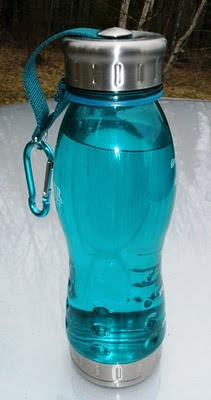
Last season we installed an extensive water treatment system at camp that provides safe, crystal-clear and great-tasting drinking water at every tap.
We invite everyone this season to bring a water bottle to take drinking water out in the boat with them rather than hauling in cases of water in plastic bottles.
This not only saves weight and space on the Lickety Split for the trip to camp but is kinder to the environment as well since there are no plastic bottles to take back to the dump.
At Bow Narrows Camp we are doing everything we can to reduce our carbon footprint.
We recycle everything that is recyclable. In Red Lake, there has been no recycling of plastic bottles to date but we have been able to recycle aluminum and steel cans and glass bottles.
We have also been able to cut our gasoline consumption nearly in half over the past five years.
Our new cabin cruiser, Lickety Split, uses 1/4 of the fuel of our old boat Raven Quill and is twice as fast. On the down side it carries 3/4 of the load of the old Raven Quill.
Our four-stroke 20 hp Honda outboards are twice as efficient as our previous two-stroke outboards.
Once you've switched to more efficient boats and engines, the greatest factor in fuel consumption is weight. The heavier the boat, or vehicle for that matter, the more fuel it takes to move it and the slower it goes.
Bow Narrows Camp doesn't put weight limits on our customers like the fly-in camps do, but weight is definitely a consideration.
Our transportation schedule and costs are based on hauling nine passengers and their gear at a time in the Lickety Split. We never run out of room in the boat but we sometimes run out of weight-capacity. This means making extra trips to pick up surplus gear and this slows down the schedule of getting people into and out of camp.
Everything you can do to reduce the weight of your gear and supplies is greatly appreciated by your fellow anglers and camp staff but especially by me!
Here are some tips.
The two easiest places to cut weight is in liquids and needless lead.
Cases of beer in cans weigh about half that of beer in bottles, especially when you remember we have to carry the empties back the other way too. A garbage bag full of empty aluminum cans is nearly weightless while you couldn't even pick up a garbage bag full of bottles.
Don't worry about bringing liquor or wine in glass bottles. There just aren't enough of them to make a difference.
Coolers full of water and ice are easily the heaviest things we put on the boat. Water weighs over eight pounds a U.S. gallon and some coolers have four or five gallons of water and ice, which is also water, in them in addition to the food or beverages. So you might have 30-40 pounds of water weight in a cooler just to keep 20-30 pounds of contents cool! Here's what you can do to help us out. Just before boarding the Lickety Split for camp, drain the water and throw away most of the ice. The trip to camp takes just 35 minutes and the cooler's ingredients won't even have begun to warm before you'll be unpacking the cooler into the cabin's refrigerator.
It won't come as a surprise to anyone that lead, the world's heaviest metal, is, well, heavy. But lots of people just don't seem to realize how much of it they're packing. Take tackle boxes for example. How many lead sinkers and jigs are you likely to really use? Most of us keep adding things to our tackle boxes over the years and never take anything out.
If you are bringing an electric trolling motor, restrict yourself to one deep cycle battery and charger for it. Incidentally we can rent you a trolling motor and battery for $50 a week. Just reserve one in advance to make sure it's waiting for you.
Most people, however, find that backtrolling with their Honda works perfectly and therefore don't need an electric motor at all.
The last tip is not to bring huge containers. We need to be able to place the weight in the boat in specific places and large containers prevent this. There's no problem with duffle bags or suitcases, tackle boxes, medium-sized plastic boxes, rod cases, coolers and cases of refreshments. Where we run into trouble is when there are bags big enough to hide a body and coffin-sized plastic boxes. One group last year brought a plastic storage box that was so large it could have doubled as a hot tub.
Nine groups out of 10 bring reasonable amounts of gear. I wish I could get the remaining 10 per cent to recognize they are needlessly heavy and that it causes major problems for everyone else, and isn't kind to the environment either.
Everybody should be perfectly outfitted for a week with: a duffle bag or suitcase, a tackle box, a rod case, a few cases of refreshments, a small cooler for the boat and maybe another small bag for staying at the motel. They will probably have a medium sized cooler for every couple of people for taking home their fish. If they're coming on the Housekeeping Plan you can add a box of groceries per person.
That is what most groups bring and we have no difficulty carrying it and them in the Lickety Split.
We also have some groups who are inspirationally light. When some individuals meet the boat they have their duffle bag in one hand and their tackle box and rod case in the other. That's all they bring. We love you guys!
Click to go back to our website:
Click to see the latest on the blog:


No comments:
Post a Comment